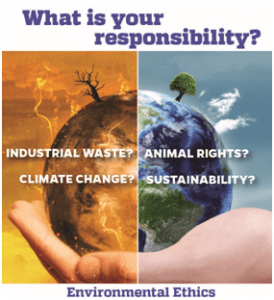THE CONTEXT: Ever since the 1st Industrial Revolution, the human imprints on elements of nature have been intense and unprecedented. This led to the emergence of Environmental Ethics. Environmental ethics is the discipline in philosophy that studies the moral relationship of human beings to, and also the value and moral status of, the environment and its non-human contents. The following article attempts to explain the concepts of shallow and deep ecologism and establish the differences between the two views.
QUESTIONS THAT COMPEL THE NEED FOR ENVIRONMENTAL ETHICS IN PRESENT TIMES
- Existential crisis: Suppose putting out natural fires, culling feral animals or removing some individual members of overpopulated species is necessary for the protection of the integrity of a certain ecosystem.
- Subsuming cultures and practices:Is it morally acceptable for farmers in non-industrial countries to practice slash and burn techniques to clear areas for agriculture?
- Rapid modernization: Consider a mining company which has performed open pit mining in some previously unspoiled areas. Does the company have a moral obligation to restore the landform and surface ecology?
- Rebuilding nature: Can the value of a humanly restored environment be compared with the originally natural environment?
These are among the questions investigated by environmental ethics. Some of them are specific questions faced by individuals in particular circumstances, while others are more global questions faced by groups and communities. One of the most radical forms of environmental ethics is deep ecology which was first advocated by Norwegian philosopher Arne Naess. The alternative to deep ecology is often referred to as shallow ecology.


DEEP AND SHALLOW ECOLOGY: A COMPARATIVE ANALYSIS
Both Deep and Shallow ecology have recognized and examined the anthropogenic problems with the environment, albeit in different ways.
DEEP ECOLOGISM
BASIC TENETS
- Deep ecologism believes that humans should radically change their relationship with nature.
- Its proponents reject shallow ecologism for prioritizing humans above other forms of life, and subsequently preserving the environmentally destructive way of life in modern societies.
ESSENCE
- The core theme of deep ecology is the claim that all living things have the same right to live and flourish. This means that the interests of other living beings have to be treated as seriously as the interests of humans.
- A rainforest, for example, can no longer be regarded as a valueless wood resource. Instead, it is a collection of living things, all of which have a right to live and flourish.
PLACE OF NATURE
- Nature is said to have intrinsic value. It is valuable even if humans can find no use for it.
TAKE ON CLIMATE CHANGE
- From a deep ecological perspective, climate change is wrong because it will affect the well-being of billions of living beings.
- Even if we could provide a way of protecting humans from climate change, it would still be a bad thing because many other living beings would suffer.
STANCE ON ANTHROPOCENTRISM
- Another aspect of deep ecology is the idea that we should expand our idea of who we are so that it includes the natural world. This is known sometimes as the expanded self. If we harm nature then we are really harming ourselves.
- Deep ecology rejects anthropocentrism in favour of ecocentrism or biocentrism. This is because the damage caused to other life forms would adversely affect
DECISION MAKING ON ENVIRONMENTAL CRISIS
- It considers that developed countries are more responsible for climate change. Hence, argues for a holistic perspective to the crisis which acknowledges regional differences and the disparities between under and over-developed nations.
AREA OF INFLUENCE
- This branch of ecologism primarily serves to maintain the lifestyle of those dwelling in developing countries.
VIABILITY IN THE PRESENT CONTEXT
- It will not permit the use of vehicles that pollute the environment.
- Could rather, turn toward Electric Vehicles.
SHALLOW ECOLOGISM
BASIC TENETS
- The fashionable fight against pollution and resource depletion is shallow ecologism.
- Exponents of this philosophy believe in continuing our present lifestyle, but with specific tweaks aimed at minimizing the damage to the environment.
ESSENCE
- Shallow ecology rejects ecocentrism and biocentrism. Shallow ecologists claim that there is nothing necessarily wrong with the anthropocentric worldview.
PLACE OF NATURE
- Nature is only valuable insofar as it serves human interests. This is sometimes known as instrumental value.
TAKE ON CLIMATE CHANGE
- From this perspective, climate change is bad because it will affect human interests.
- It is humans that will ultimately suffer if climate change is allowed to occur.
- Damage caused by climate change might, for example, mean that it is difficult to obtain natural resources. It might also be that humans would simply not like to live on a damaged planet.
STANCE ON ANTHROPOCENTRISM
- Shallow ecologists claim that there is nothing necessarily wrong with the anthropocentric worldview.
- Even if there was a way of protecting humans from the effects of climate change, shallow ecologists would still think it was a bad thing to splurge for the cause of Climate Change.
DECISION MAKING ON ENVIRONMENTAL CRISIS
- A ‘Global’ approach to the environmental crisis is preferred.
AREA OF INFLUENCE
- This branch of ecologism primarily serves to maintain the lifestyle of those dwelling in developed countries.
VIABILITY IN THE PRESENT CONTEXT
- Also, it may include the use of vehicles that cause less pollution or air conditioners that do not release chlorofluorocarbons (CFCs).
DEEP ECOLOGISM: THE WAY TO GO
- IN WAKE OF GROWING INEQUALITIES: Deep ecologism maintains that by not changing the lifestyle, shallow ecologism further widens the inequalities between countries. For instance, despite constituting only 5% of the world’s population, the U.S. accounts for 17% of the world’s energy consumption and is the second largest consumer of electricity after China.
- FOR BRIGHTER & HEALTHIER FUTURE: Deep ecologism aspires to sustain nature by making large-scale changes to our lifestyle. These may include limiting the commercial farming of meat to preserve forest areas and reduce the artificial fattening of animals or the reshaping of transport systems which involve the use of internal combustion engines or electronic mobility.
- FOR PEACEFUL COEXISTENCE: To recognise the complex richness of different lifeforms, deep ecologism calls for a re-evaluation of the ‘survival of the fittest doctrine. Survival of the fittest should be understood through the human ability to cooperate and coexist with nature, as opposed to exploiting or dominating it. Deep ecologism thus prioritizes a ‘live and let live’ attitude over an ‘either you or me’ approach.
- BROADER APPROACH:Næss argues that a narrow focus on pollution and conservation movements is counterproductive. He believes that when projects are only implemented to solve pollution, it generates evils of a different kind. For instance, the installation of pollution control devices may increase the cost of living, leading to an increase in class differences. An ethically responsible ecologism is one which operates in the interest of all economic classes.
THE CONCLUSION: Owing to increased anthropocentrism, humans have cut themselves off from nature, viewing nature and themselves as competing entities and establishing a master-slave dynamic. A narrow focus on pollution and conservation movements is counterproductive. A holistic perspective to the environmental crisis is one which acknowledges regional differences and the disparities between under and over-developed nations. While low and middle-income countries have recorded lower cumulative and per capita carbon dioxide emissions over the past two centuries, it is the wealthier countries which are most responsible for a majority of carbon emissions. Thus, profound wisdom (as mentioned by Socrates) of deep ecologism is required so as to annihilate practices and conduct derogatory to the overall environment. We should adopt ethically responsible ecologism which operates in the interest of all economic classes.
QUESTIONS TO PONDER
- Evaluate the need for Environmental Ethics in present times.
- Discuss how both Deep and Shallow ecologism have recognized and examined the anthropogenic problems with the environment. Which one according to you is more relevant in present times?
- “A narrow focus on pollution and conservation movements is counterproductive.” In the light of the statement, explain ‘Deep Ecologism’

